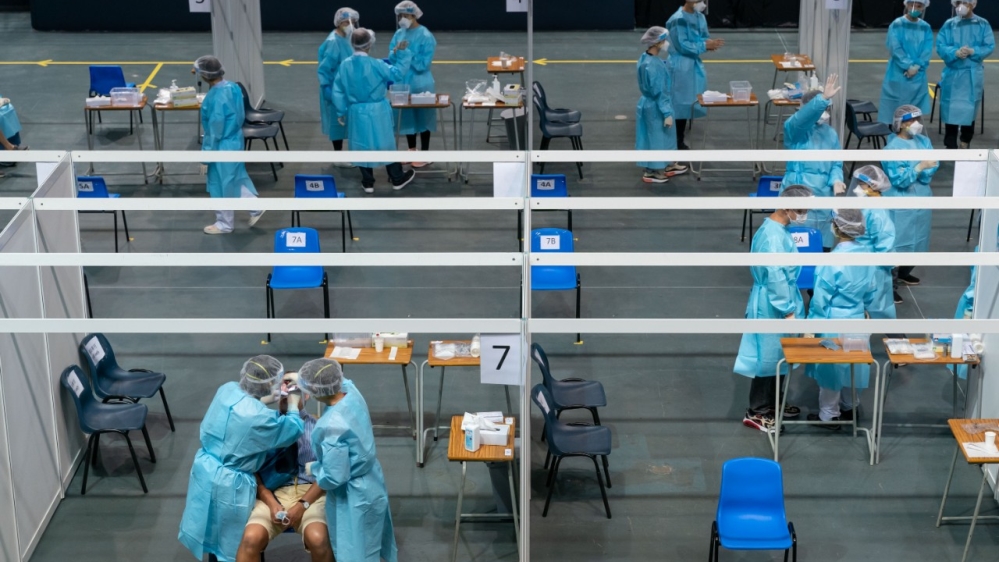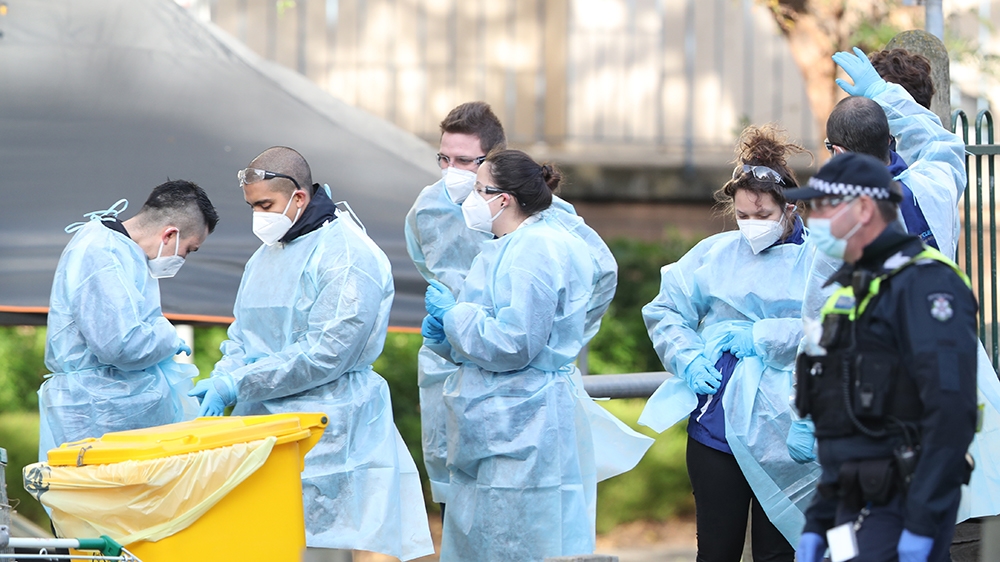- Melbourne looks to be on course to ease out of a strict lockdown and curfew from September 28, as the average number of cases drops.
- Some 29.4 million people around the world have been diagnosed with COVID-19 and 931,454 people have died, according to data from Johns Hopkins University. Nearly 20 million people have recovered from the disease.
Here are the latest updates:
Wednesday, September 16
02:35 GMT – Japan commits $135m to WHO’s global vaccine programme
Japan has committed 17.2 billion yen ($165 million) in funds for the WHO’s global COVID-19 vaccine programme, known as COVAX.
The initiative is aimed at helping buy and fairly distribute a COVID-19 vaccine to countries around the world. But some countries which have secured their own supplies through bilateral deals, including the United States, have said they will not join.
Japan has also pursued independent arrangements with global pharmaceutical companies to secure vaccines, with the government pledging to have enough supply for the whole population by the first half of 2021. The COVAX programme has set a Sept. 18 deadline for contributions.
02:30 GMT – Hong Kong wraps up mass testing programme
Hong Kong has wrapped up a mass testing programme that fuelled controversy because of the involvement of experts from the mainland.
About 1.78 million specimens were collected in the two-week exercise with at least 42 COVID-19 cases found as a result of the testing and associated contact tracing, according to the government.
The territory, which is home to about 7.5 million people, is to begin relaxing some of its coronavirus curbs from Friday.

Hong Kong’s mass testing programme for COVID-19 began on September 1 [Anthony Kwan/EPA]
02:20 GMT – China suspends poultry imports from second US plant
China has suspended imports from an OK Foods poultry plant in Arkansas, because of coronavirus cases among workers, according to the USA Poultry & Egg Export Council.
It’s the second US poultry factory to be blocked because of an outbreak among employees. “We don’t think that either one of these two are justified, especially considering the fact that the virus cannot be transmitted in poultry meat,” said Jim Sumner, president of the USA Poultry & Egg Export Council.
Chinese customs authority GACC suspended imports from the OK Foods facility, he said. The Arkansas plant became ineligible to ship products to China on Sepember 13, according to the US Department of Agriculture.
02:00 GMT – Trump quizzed on COVID-19 response at election town hall
US President Donald Trump has been questioned by voters on his coronavirus response at a town hall meeting in Pennsylvania.
Asked by one uncommitted Pennsylvania voter why he had played down a pandemic that was known to endanger low-income families and minority communities, he claimed he had done the opposite.
“I didn’t downplay it. In many ways I up played it in terms of action,” Trump said at the event, which was sponsored by ABC News.
“You do not admit to it yourself?” the voter, Ajani Powell, interrrupted.
Trump continued, “Yeah, because what I did is with China, I put a ban on. With Europe, I put a ban on and we would have lost thousands of more people had I not put the ban on. So, that was called action. Not with the mouth but in actual fact.”
He also said a vaccine would probably be available soon. “We’re very close to having a vaccine,” he told the audience. “We’re within weeks of getting it you know could be three weeks, four weeks.”
|
Trump accused of playing down COVID-19 crisis in new book |
01:00 GMT – Victoria on course to ease Melbourne lockdown by month’s end
Australia’s Victoria state looks to be on course to relax a strict lockdown in the city of Melbourne by the end of the month after the average number of cases over the last two weeks dropped below 50, which is within the target range for the state to ease restrictions from September 28.
The fall in cases in recent days – 42 were reported across the state on Wednesday – from early August’s triple-digit highs means some curbs will be eased in rural areas of the state late on Wednesday.
In these places, outdoor gatherings of up to 10 people will be permitted, residents of a household will be allowed to visit one other home, and cafes will be able to seat up to 50 people outside.
#COVID19VicData UPDATED: We have reissued today’s data as there are 81 cases with unknown source in Metro Melbourne, not 82, as earlier tweeted. Yesterday there were 42 new cases reported and 8 lives lost. Info: https://t.co/eTputEZdhs pic.twitter.com/buI8b9yv7J
— VicGovDHHS (@VicGovDHHS) September 15, 2020
00:00 GMT – Poorly-fitting masks increase risk to health workers who are female or Asian: study
A new study has found female healthcare workers and medical staff with Asian heritage are more vulnerable to COVID-19 infection because they are less likely to be using face masks that fit them properly.
The analysis published in the journal Anaesthesia looked at studies into the assessment of filtration masks like the N95 and FFP2 models, which are used by medical workers in high-risk situations.
Their review looked at research that showed higher initial fit-pass rates in Caucasians (90 percent) compared with Asians (84 percent) and said particularly low initial fit-pass rates were found in Asian women, with a reported average of just 60 percent.
In the US, the report said authorities use a fit-test panel to assess the suitability of the N95 masks provided to healthcare workers, but they noted that the facial dimensions represented by the panel were based on a group of people in which women and Asians were “underrepresented”.
In many countries around the world, women make up at least three-quarters of all healthcare staff. The authors said that to ensure a mask is not liable to leak, it needs to adequately fit the face shape of the wearer, adding that fit appears to be more important for protection from airborne viral spread than the filtration capacity of the mask itself.

Female medical workers and people of Asian origin are more at risk from COVID-19 because their masks are less likely to fit properly, according to a new study [File: David Crosling/EPA]
—-
Hello and welcome to Al Jazeera’s continuing coverage of the coronavirus pandemic. I’m Kate Mayberry in Kuala Lumpur.
Read all the updates from yesterday (September 15) here.
